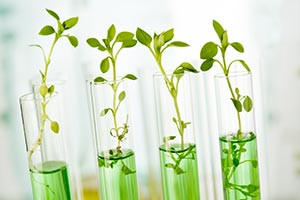Are you looking to master the fundamentals of plant genetics? This course will teach you how plants have evolved and their different classifications and especially inheritance in plant genetics. It deals with the selective advantage of reproduction which can either be sexual or asexual. In asexual reproduction, the offspring has the same DNA and alleles, whilst in sexual reproduction, separate organisms combine their alleles, thereby increasing the chances of preserving copies of their alleles. Discover the different causes of changes in DNA and identify the other manufactured mutagenic chemicals that seem to be multiplying in our world. Statically, these mutations are harmful, and the larger-sized mutations significantly increase the probability of affecting a crucial part of the DNA and you will discover the need for DNA repair processes that help counter the adverse effects of mutations.
Firstly, the course will introduce the different concepts of evolution and how evolution by natural selection has changed the abundance of alleles present in various species. How quickly does the process of evolution occur? This course will highlight how slow evolution occurs when compared to the duration of human life. The course content also covers natural selection, an essential factor in evolution. It describes how those species which conform to a particular environment are more likely to survive when compared to those that are less adapted. In addition, you will also work through the two conditions that must be met for natural selection to occur. The first one has to do with the offspring being able to grow to maturity in that particular habitat, and the second one relates to the need for the progeny to have different types of alleles. An overview of the different properties of gymnosperms and all their economic relevance is essential for you to know as someone in botany. Gymnosperm plants grow in all parts of the world, although they tend to thrive in temperate regions. What are the different classifications of gymnosperms? This course will give you an overview of the diverse classes and orders of gymnosperm plants. You will analyze why flowering plants or angiosperms are rated as the most successful and abundant plants in the world today. The final section of the course studies the factors influencing the formation of fossils, evolution of flowering plants, life cycle of angiosperms, ecological classification of plants, and ecosystem structures.
This plant genetics course will interest anyone interested or involved in plant genetics such as those in botany, biology or environmental studies. The basics of plant genetics are an important area of expertise because it forms the basis for what we know about plants, pollination, environmental interactions and much more.
What You Will Learn In This Free Course
View All Learning Outcomes View Less All Alison courses are free to enrol, study, and complete. To successfully complete this Certificate course and become an Alison Graduate, you need to achieve 80% or higher in each course assessment.
Once you have completed this Certificate course, you have the option to acquire an official Certificate, which is a great way to share your achievement with the world.
Your Alison certificate is:
- Ideal for sharing with potential employers.
- Great for your CV, professional social media profiles, and job applications.
- An indication of your commitment to continuously learn, upskill, and achieve high results.
- An incentive for you to continue empowering yourself through lifelong learning.
Alison offers 2 types of Certificate for completed Certificate courses:
- Digital Certificate: a downloadable Certificate in PDF format immediately available to you when you complete your purchase.
- Physical Certificate: a physical version of your officially branded and security-marked Certificate
All Certificate are available to purchase through the Alison Shop. For more information on purchasing Alison Certificate, please visit our FAQs. If you decide not to purchase your Alison Certificate, you can still demonstrate your achievement by sharing your Learner Record or Learner Achievement Verification, both of which are accessible from your Account Settings.












 Avg. Hours
Avg. Hours  Contains Video
Contains Video  CPD Accredited
CPD Accredited 
 Total XP:
Total XP: 
 Knowledge & Skills You Will Learn
Knowledge & Skills You Will Learn 







